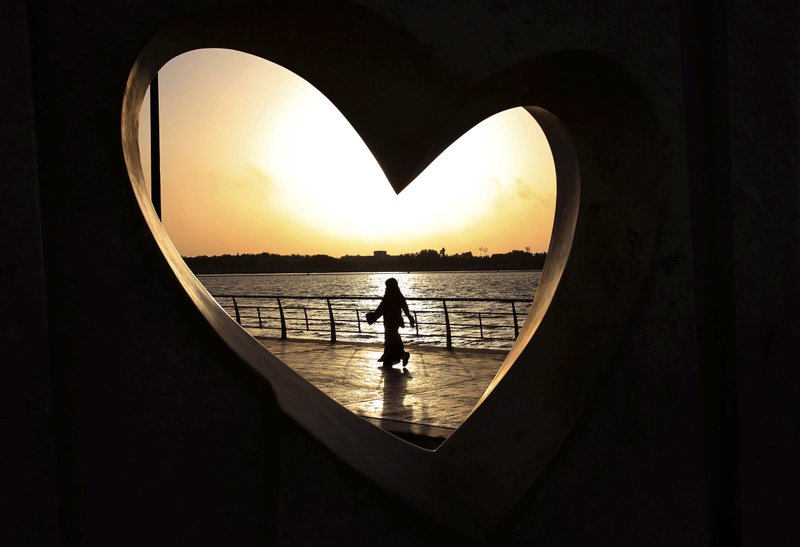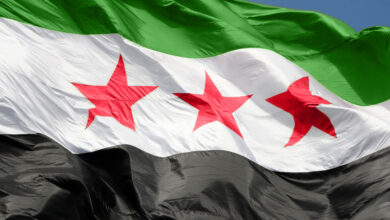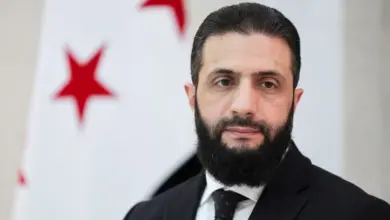
Hundreds of Syrians gathered at landmark squares in the Syrian capital Saturday, honking their car horns, flashing victory signs and waving Syrian flags in scenes of defiance that followed unprecedented joint airstrikes by the United States, France and Britain.
A few hours earlier, before sunrise, loud explosions jolted Damascus and the sky turned orange as Syrian air defense units fired surface-to-air missiles in response to three waves of military strikes meant to punish President Bashar Assad for his alleged use of chemical weapons.
Associated Press reporters saw smoke rising from east Damascus and what appeared to be a fire light up the sky. From a distance, US missiles hitting suburbs of the capital sounded like thunder. Shortly after the one-hour attack ended, vehicles with loudspeakers roamed the streets of Damascus blaring nationalist songs.
“Good souls will not be humiliated,” Syria’s presidency tweeted after the airstrikes began.
Immediately after the attack, hundreds of residents began gathering in the landmark Omayyad square of the Syrian capital, celebrating what they said was the army’s success in shooting down or derailing some of the missiles. Many waved Syrian, Russian and Iranian flags. Some clapped their hands and danced, other drove in convoys, honking their horns in defiance.
“We are your men, Bashar,” they shouted. Others shouted: “Oh Trump you are a monkey. Oh Trump you are an animal,” as they stood in the square decorated with a giant colored “I Love Damascus” sign. The taunts were a clear retort to Trump calling Assad an “animal” in tweets following the suspected chemical weapons attack.
Syrian state TV broadcast live from the square where a large crowd of civilians mixed with men in uniforms, including an actor, lawmakers and other figures.
US President Donald Trump announced Friday night that the three allies had launched military strikes to punish Syrian Assad for alleged chemical weapons use and to prevent him from doing it again. Trump said Washington is prepared to “sustain” pressure on Assad until he ends what the president called a criminal pattern of killing his own people with internationally banned chemical weapons.
The Syrian government has repeatedly denied any use of banned weapons. A fact-finding team of inspectors from the international chemical weapons watchdog was in Damascus and had been expected to head to the town of Douma on Saturday, scene of the suspected chemical weapons attack that killed more than 40 people.
A Syrian military statement said in all, 110 missiles were fired by the US, Britain and France and that most of them were shot down or derailed.
The statement read by Brig. Gen. Ali Mayhoub said three civilians were wounded in one of the US-led strikes on a military base in Homs, although the attack was aborted by derailing the incoming missile. He said another attack with “a number of missiles” targeting a scientific research center in Barzeh, near Damascus, destroyed a building and caused other material damage but no human losses. Mayhoub added the building in the research center included an educational center and labs.
The attack began at 4 a.m. (0100 GMT) with missiles hitting the eastern suburbs of Damascus, shaking the grounds from a distance. The sky looked orange over eastern Damascus apparently as a result of fires caused by the missiles hitting Syria. Air defense units fired surface-to-air missiles from different directions toward incoming missiles.
At about sunrise, the sound of explosions could be heard just as the loudspeakers from the city’s mosques called for morning prayers.
A car with loudspeakers blaring the national song “Oh Syria, You Are My Love” could be heard driving through central Damascus amid the attack.
Syrian TV called the attacks a “blatant violation of international law and shows contempt for international legitimacy.”
US Defense Secretary James Mattis said there were no reports of US losses during the initial airstrikes.
“Right now this is a one-time shot,” he said but did not rule out further attacks. He said the airstrikes were launched against several sites that helped provide Assad’s ability to create chemical weapons.
France’s foreign minister said the “chemical escalation” in Syria is not acceptable because it’s violating the rules of war and of humanity. Jean-Yves Le Drian told reporters Saturday that the joint military operation in Syria is legitimate, limited and proportionate.
Britain’s defense ministry said that while the effectiveness of the strike is still being analyzed, “initial indications are that the precision of the Storm Shadow weapons and meticulous target planning have resulted in a successful attack.”
British Prime Minister Theresa May described the attack as neither “about intervening in a civil war” nor “about regime change” but a limited and targeted strike that “does not further escalate tensions in the region” and does everything possible to prevent civilian casualties.
The decision to strike, after days of deliberations, marked Trump’s second order to attack Syria; he authorized a barrage of Tomahawk cruise missiles to hit a single Syrian airfield in April 2017 in retaliation for Assad’s use of sarin gas against civilians.
Trump chastised Syria’s two main allies, Russia and Iran, for their roles in supporting “murderous dictators,” and noted that Russian President Vladimir Putin had guaranteed a 2013 international agreement for Assad to get rid of all of his chemical weapons. He called on Moscow to change course and join the West in seeking a more responsible regime in Damascus.
The Iranian Foreign Ministry strongly condemned the US-led airstrikes on Syria and warned of unspecified consequences.
Russia’s US embassy released a statement warning that the airstrikes will “not be left without consequences.” It said that “all responsibility” rests with Washington, London and Paris.
The allied operation comes a year after a US missile strike that Trump said was meant to deter Assad from further use of chemical weapons. Since that did not work, a more intense attack would aim to degrade his ability to carry out further such attacks, and would try to do this by hitting Syrian aircraft, military depots and chemical facilities, among other things.
The one-off missile strike in April 2017 targeted the airfield from which the Syrian aircraft had launched their gas attack. But the damage was limited, and a defiant Assad returned to episodic use of chlorine and perhaps other chemicals.
Friday’s strikes appear to signal Trump’s willingness to draw the United States more deeply into the Syrian conflict. The participation of British and French forces enables Trump to assert a wider international commitment against the use of chemical weapons, but the multi-pronged attack carries the risk of Russian retaliation.
In his nationwide address, Trump stressed that he has no interest in a longtime fight with Syria.
“As other nations step up their contributions, we look forward to the day when we can bring our warriors home,” he said.
The US has about 2,000 troops on the ground in Syria as advisers to a makeshift group of anti-Islamic State fighters known as the Syrian Democratic Forces.




